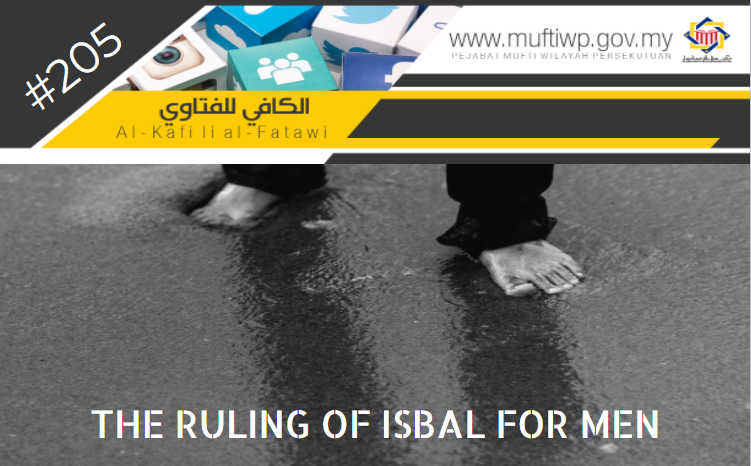Question:
Assalamualaikum w.b.t,
May al-Fadhil SS Mufti give some explanation on the ruling of isbal for men?
Thank you.
Answer:
Waalaikumussalam wrm. wbt.
Alhamdulillah, praise and thanks to Allah for the countless blessings He has blessed us all with. Blessings and salutations to the Prophet Muhammad PBUH, his wives, his family, companions and all those that follow his teachings to the day of judgement.
In Fiqh discussion, the phrase ‘isbal’ may refer to many meanings. Some scholars refer this term as to the action of putting one’s hand to the chest in standing position whilst reciting al-Fatihah. This is the opinion of some scholars in madhhab Maliki which is different from the qawl jumhur who put the ruling of Sunnah to clasp one’s hand, which is by placing the right hand over the left.
Isbal also, normally, refers to one’s action of lengthening their clothes, like the robe or trousers more than the ankle. This action is not a problem, and even is encouraged for women to cover their awrah. However, for men, scholars have differing opinions.
It is narrated from Abu Dhar RA that the Prophet PBUH said:
ثَلاَثَةٌ لاَ يُكَلِّمُهُمُ اللَّهُ يَوْمَ الْقِيَامَةِ وَلاَ يَنْظُرُ إِلَيْهِمْ وَلاَ يُزَكِّيهِمْ وَلَهُمْ عَذَابٌ أَلِيمٌ " قَالَ فَقَرَأَهَا رَسُولُ اللَّهِ صلى الله عليه وسلم ثَلاَثَ مِرَارٍ . قَالَ أَبُو ذَرٍّ خَابُوا وَخَسِرُوا مَنْ هُمْ يَا رَسُولَ اللَّهِ قَالَ " الْمُسْبِلُ وَالْمَنَّانُ وَالْمُنَفِّقُ سِلْعَتَهُ بِالْحَلِفِ الْكَاذِبِ "
Three are the (persons) with whom Allah would neither speak on the Day of Resurrection, nor would look at them nor would absolve the and there is a painful chastisement for them. The Messenger of Allah (ﷺ) repeated it three times. Abu Dharr remarked: They failed and they lost; who are these persons, Messenger of Allah? Upon this he (the Holy) Prophet) observed: They are: the dragger of lower garment, the recounter of obligation the seller of goods by false oath.
Sahih Musim (106)
Some scholars said the reason for the prohibition of isbal is due to that this action was a Jahili custom for the noblemen who wear lower garments which drag to the back until their servants have to hold them when walking. This action portrays takabbur and showing off one’s wealth. This action also denies one’s tawadu’ (humility).
This is in line with the saying of Allah SWT:
وَلَا تَمْشِ فِي الْأَرْضِ مَرَحًا ۖ إِنَّكَ لَن تَخْرِقَ الْأَرْضَ وَلَن تَبْلُغَ الْجِبَالَ طُولً
And do not walk upon the earth exultantly. Indeed, you will never tear the earth [apart], and you will never reach the mountains in height.
Surah al-Isra’ (37)
It should be considered here whether this prohibition is due to ta’abbudi purpose like other specific or mahdhah ibadah or is it a worldly matter linked to an illah. Sheikh Dr. Yusuf al-Qaradhawi explains this matter in his book How Do We Interact with Sunnah Nabawiyyah (كيف نتعامل مع السنة النبوية) page 124-125, by citing hadith other than this narration from Abdullah bin Umar R.anhuma where the Prophet PBUH said:
" مَنْ جَرَّ ثَوْبَهُ خُيَلاَءَ لَمْ يَنْظُرِ اللَّهُ إِلَيْهِ يَوْمَ الْقِيَامَةِ ". قَالَ أَبُو بَكْرٍ يَا رَسُولَ اللَّهِ إِنَّ أَحَدَ شِقَّىْ إِزَارِي يَسْتَرْخِي، إِلاَّ أَنْ أَتَعَاهَدَ ذَلِكَ مِنْهُ. فَقَالَ النَّبِيُّ صلى الله عليه وسلم " لَسْتَ مِمَّنْ يَصْنَعُهُ خُيَلاَءَ "
The Prophet (ﷺ) said Allah will not look, on the Day of Resurrection at the person who drags his garment (behind him) out of conceit. On that Abu Bakr said, "O Allah's Messenger (ﷺ)! One side of my Izar hangs low if I do not take care of it." The Prophet (ﷺ) said, 'You are not one of those who do that out of conceit."
Sahih al-Bukhari (3665)
Al-Qaradhawi also stated that tarjih made by Imam al-Nawawi and Imam Ibn Hajar al-Asqalani on the prohibition of isbal is linked to the attribute of (خيلاء) which is boastful.
Hence, when reading those related excerpts, a conclusion made is, if it is one’s or his community’s habit to isbal without intending to boast and show off, then it is exempted from the prohibition stated in the hadith.
Wallahu a’lam.


